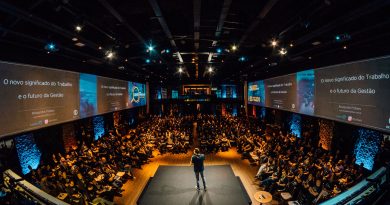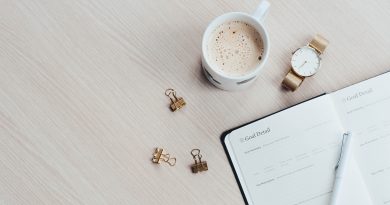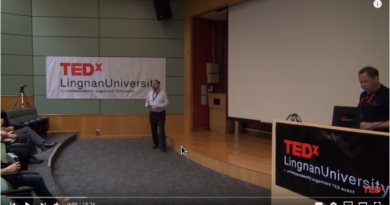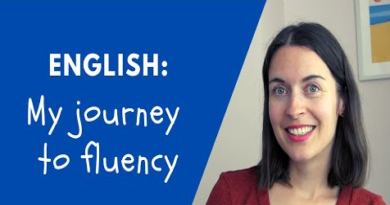Video | 7 Simple Tips to Improve Your Listening Comprehension
Crédito da imagem: Elice Moore on Unsplash
Neste vídeo do canal do poliglota Luca Lampariello, ele nos dá dicas valiosas sobre como melhorar a nossa compreensão auditiva de um idioma.
Aqui você vai encontrar uma expressão, que não possui uma tradução exata para o português: Miss the forest for the trees. Esta expressão, em uma tradução literal, significa, “olhar para as árvores e não ver a floresta”, ou ainda, “deixar de ver a floresta por ficar olhando para as árvores”.
Mas nós brasileiros não usamos esta expressão, a tradução mais adequada para nós brasileiros seria, “focar nos detalhes e não ver o todo”.
Luca Lampariello fala 12 idiomas e a cada dois anos aprende um idioma novo. Saiba mais.
| Audio | |
|---|---|
Normal | Slow |
| English Transcript | Tradução |
| So, some two years ago I was having the very first coaching lesson with a student of mine, who had been trying to learn Spanish but to no avail, and it turned out that he had been, you know, learning the language for a few months and I asked him: "what are you doing to learn Spanish?", and it turns out that he was actually listening to the radio and listening massively in order to understand, in the hope that he would understand everything with time. | Então, há dois anos eu estava tendo a primeira aula de coaching com um aluno meu, que estava tentando aprender espanhol, mas sem sucesso, e descobriu-se que ele estava, você sabe, aprendendo o idioma por alguns meses e eu perguntei a ele: "o que você está fazendo para aprender espanhol?", e acontece que ele estava realmente ouvindo o rádio e ouvindo massivamente a fim de entender, na esperança de que ele entendesse tudo com o tempo. |
| And of course, listening comprehension, like all good things, takes time, it takes exposure, but you have to learn how to do it. | E é claro que par desenvolver a compreensão auditiva, como tudo que é bom leva tempo, é preciso exposição, mas você tem que aprender a fazê-lo. |
| You might be in the same situation right now. | Você pode estar na mesma situação agora. |
| Maybe you're learning a language and you're wondering why you still don't understand the language, why is it so difficult, why are you struggling, and in this very same video I'm going to give you some fundamental tips on how to make your listening comprehension fantastic in a relatively short amount of time. | Talvez você esteja aprendendo um idioma e está se perguntando por que ainda não entende a língua, por que é tão difícil, por que você está lutando, e neste mesmo vídeo eu vou te dar algumas dicas fundamentais sobre como tornar sua compreensão auditiva fantástica em um período de tempo relativamente. |
| So in this video I'm going to give you the fundamental rules of thumb or tips in order to understand any language quickly and effectively and we're going to have a very cool extra tip at the end, so please, stay tuned. | Então, neste vídeo eu vou te mostrar as regras básicas ou dicas para entender qualquer idioma de forma rápida e eficaz e nós vamos ter uma dica extra muito legal no final, então por favor, fique ligado. |
| The fundamental rule of thumb in order to understand the language better and better is to get exposed to comprehensible input, that is, input that you can understand and when you are a beginner, when you first start learning a language, make sure that you always always listen and read at the same time, because if you can read and listen at the same time, you will be able to actually SEE the words that are being spoken and this allows you to build comprehensible input that will help you in the intermediate stage when you can venture into the unknown ground of pure listening. | A regra fundamental para entender cada vez melhor a língua é se expor a algo que você consiga compreender, ou seja, ouvir coisas que você possa entender e quando você é um iniciante, quando você começa a aprender um idioma, certifique-se de que você sempre ouça e leia ao mesmo tempo, porque se você pode ler e ouvir ao mesmo tempo, você poderá realmente VER as palavras que estão sendo ditas e isso te permitirá contruir uma entrada compreensível que o ajudará no estágio intermediário quando você poderá então se aventurar no terreno desconhecido da escuta pura. |
| But you have to remember that the listening comprehension process, as well as the language learning process, is not linear but it's progressive, so always make sure no matter what stage you're in that you expose yourself to comprehensible input, the input that you can understand at least to 70 or 80 percent. | Mas você tem que se lembrar de que o processo de compreensão auditiva, bem como o processo de aprendizagem de idiomas não é linear, mas é progressivo, então certifique-se sempre de que estágio você está em que você se expõe a áudios que você compreenda, pelo menos algo entre 70 ou 80% do que ouvir. |
| How many times have you found yourself sitting in a class and not caring at all about what you were listening to? | Quantas vezes você se viu sentado em uma aula e não se importava com com o que estava ouvindo? |
| This is common especially and when to language learning at school at university because people are not interested, they're in a passive state of mind, and one of the reasons is because they're not interested in what they're listening to. | Isso é comum especialmente e quando a aprendizagem de idiomas se dá na universidade porque as pessoas não estão interessadas, elas estão em um estado de espírito passivo, e uma das razões é porque elas não estão interessadas no que estão ouvindo. |
| They, they don't care, they didn't choose the material, they didn't choose the audio or the text. | Elas não se importam, não escolheram o material, não escolheram o áudio ou o texto. |
| So as an independent language learner, YOU have the possibility of listening to whatever you like. | Então, como um aprendiz de idioma independente, você tem a possibilidade de ouvir o que quiser. |
| Make sure that what you listen to is something you find interesting because if it is interesting for you, your levels of dopamine in your brain will literally skyrocket and you will absorb the content much better. | Certifique-se de que o que você ouve é algo que acha interessante, porque se for interessante para você, os níveis de dopamina em seu cérebro irão literalmente disparar e você absorverá o conteúdo muito melhor. |
| Have you ever found yourself interacting with native speakers in a language you still didn't know well and you're trying to understand every single word they try that they were saying to you? | Você já se viu interagindo com falantes nativos em uma língua que você ainda não conhece bem e você está tentando entender cada palavra que eles dizem para você? |
| Well, I think that a better technique or a better strategy is to simply focus on the big picture. | Bem, eu acho que uma técnica ou estratégia melhor é simplesmente focar no quadro geral. |
| I really like the sentence in English "missing the forest for the trees" - you don't want to "miss the forest for the trees" so even if you don't understand all the words, focus on the big picture so focus on the cue words inside the sentence that would give you the meaning of the sentence even if you don't understand all the elements of the sentence itself. | Eu realmente gosto da frase em inglês "deixar de ver a floresta para olhar as árvores" - você não quer "deixar de ver a floresta para olhar as árvores" então mesmo que você não entenda todas as palavras, concentre-se no quadro geral, foque nas palavras chave dentro da frase que lhe darão o significado da frase mesmo que você não entenda todos os elementos da frase em si. |
| This is really important so relax you need to understand everything you just focus on the main things on the main cues, and focus on the big picture. | Isso é realmente importante, então relaxe, você não precisa entender tudo, o que você precisa é focar nos pontos mais importantes, nas principais pistas, e se concentrar no quadro geral. |
| Every uttered sentence in any language is a complex combination of sounds. | Cada frase pronunciada em qualquer língua é uma combinação complexa de sons. |
| In order to make your life easier, in order to understand, absorb and replicate these phonetic pattern, you might want to make your life easier and do things step-by-step. | A fim de tornar sua vida mais fácil de entender, absorver e replicar esses padrões fonéticos, você pode querer simplificar as coisas e fazer as tudo passo a passo. |
| One very very easy strategy in order to tackle this problem is very simple: you just slow the audio down. | Uma estratégia muito fácil para resolver esse problema é muito simples: é só diminuir a velocidade do áudio. |
| So take the audio track or the audio tracks that you have, play them at normal speed and then play them a little bit more slowly. | Então pegue a faixa de áudio ou as faixas de áudio que você tem, reproduza-as em velocidade normal e, em seguida, reproduza-as um pouco mais lentamente. |
| In order to do this you have many possibilities nowadays, for example you can use free software programs that you can download from the internet like AuDIria (or AudiRIa) but you can also use Google Translate. | Para fazer isso você tem muitas possibilidades hoje em dia, por exemplo, você pode usar programas de software gratuitos que você pode baixar da internet como AuDIria (ou AudiRIa), mas você também pode usar o Google Translate. |
| You can simply put a sentence inside the box and play it and the second time it will be uttered slowlier. | Você pode colocar uma frase dentro da caixa e tocá-la e a segunda vez será toca mais lentamente. |
| So this is very simple: make sure that you always slow down the audio, look at the bigger picture, look at the details, and make it a habit. | Então é muito simples: certifique-se de sempre desacelerar o áudio, olhe para o quadro geral, olhe para os detalhes e faça disto um hábito. |
| Especially at the beginning, this will make a big difference. | Especialmente no início, isso fará uma grande diferença. |
| If I say the word "listening" associated with language learning, probably you think "Ok, listening to a podcast or listening and watching a movie or listening to music in a foreign language". | Se eu disser a palavra "ouvir" associada ao aprendizado de idiomas, provavelmente você pensa "Ok, ouvir um podcast ou ouvir e assistir um filme ou ouvir música em uma língua estrangeira". |
| That is true, but there are so many other activities you can engage in when it comes to listening, and it's not only WHAT you do but HOW you do it and WHERE you put your attention. | Isso é verdade, mas há tantas outras atividades que você pode se envolver quando se trata de ouvir, e não é só o que você faz, mas como você faz e em que você presta atenção. |
| You can for example listen to a podcast just for the sake of listening to it while you are running some errands but you can also listen to a podcast focusing on the pronunciation and intonation of the language that you you're listening to or you can even take notes, that is, you're listening to a podcast in a foreign language for the sake of grabbing and absorbing information so what you do and how you do it counts and you have to make it varied. | Você pode, por exemplo, ouvir um podcast apenas por ouvir enquanto você está fazendo algumas tarefas, mas você também pode ouvir um podcast com foco na pronúncia e entonação da linguagem que você está ouvindo ou você pode também tomar notas, ou seja, ouvir um podcast em uma língua estrangeira para pegar e absorver informações, de forma que o que você faz e como faz conta e você tem que variar. |
| The more varied activities the better. | Quanto mais variadas as atividades, melhor. |
| "Good things take time" - I always say it out loud to myself when things get frustrating and they do get frustrating when for example, I don't understand the language still, when I would like to talk to someone and I still just understand the gist of it, when I don't understand the radio. | "Coisas boas levam tempo" - Eu sempre digo isso em voz alta para mim mesmo quando as coisas ficam frustrantes e elas ficam frustrantes quando, por exemplo, eu não entendo a linguagem ainda, quando eu gostaria de falar com alguém e eu ainda entendo a essência da coisa, quando eu não entendo o rádio. |
| So you have to remind yourself that it takes massive exposure to understand the language, it takes volume, it takes sampling. | Então você tem que lembrar a si mesmo que é preciso exposição maciça para entender a linguagem, é preciso volume, é preciso experimentação. |
| These are the most important nutrients for your brain. | Estes são os nutrientes mais importantes para o seu cérebro. |
| So on the one hand, you need massive exposure, on the other hand you have to find a system to distribute this massive exposure, you have to do it day by day. | Então, por um lado você precisa de exposição maciça, por outro lado, você tem que encontrar o sistema para distribuir essa exposição maciça que você tem que fazer dia após dia. |
| That's the best way. | Essa é a melhor maneira. |
| And how to do that? | E como fazer isso? |
| Well, just one of the strategy is to associate your listening activity with something else. | Bem, uma das estratégias é associar sua atividade de escuta com outra coisa. |
| For example you just listen to something that you can obviously understand and you do it while you're doing something else. | Por exemplo, você ouve algo que você pode obviamente entender e faz isso enquanto está fazendo outra coisa. |
| I myself do some work out in the morning while I listen to Polish podcasts. | Eu mesmo me exercito pela manhã enquanto escuto podcasts poloneses. |
| So remember, do something every single day, be consistent, good things take time but if you do that, you will make it happen. | Então lembre-se de fazer algo todos os dias, ser consistente, coisas boas levam tempo, mas se você fizer isso, você terá sucesso. |
| So here you have it: listening and understanding the language takes time but it's not difficult, you learn how to do it and you have to be consistent. | Então aqui está: ouvir e entender a linguagem leva tempo, mas não é difícil, você aprende como fazer e precisa ser consistente. |
| Now if you want to know more just click on the description box below and head over my blog where you will be able to listen to the article I put together and you can even just listen to it, so you can do this while doing something as I suggested in this very same video. | Agora, se você quiser saber mais basta clicar na caixa de descrição abaixo e ir até o meu blog onde você poderá ouvir o artigo que eu escrevi e você pode até mesmo apenas ouvi-lo enquanto faz outra coisa, como sugeri neste mesmo vídeo. |
| Now, I have one question and one extra tip for you. | Agora eu tenho uma pergunta e uma dica extra para você. |
| Let's start with a question. | Vamos começar com uma pergunta. |
| What is the biggest struggle that you have when it comes to listening comprehension and what have you done to overcome it or what do you think you can do to overcome it? | Qual é a maior dificuldade que você tem quando se trata de compreensão e o que você fez para superá-la ou o que você acha que pode fazer para superá-la? |
| So, since you've been in so patient I want to reward you for your patience and I'm going to give you one cool extra tip and here it is: When we think about listening, we tend to think that listening is just a passive activity, just listen to something and the sounds flow into your ear. | Então, já que você está tão paciente eu quero recompensá-lo por sua paciência e eu vou te dar uma dica extra legal e aqui está: Quando pensamos em ouvir, tendemos a pensar que ouvir é apenas uma atividade passiva, basta ouvir algo e os sons fluem para o seu ouvido. |
| But you can actually do something that can completely change your strategy and your listening comprehension and that is be ACTIVE. | Mas você pode realmente fazer algo que pode mudar completamente sua estratégia e sua compreensão auditiva e isso é ser ATIVO. |
| Let me give you a very simple example. | Deixe-me dar um exemplo muito simples. |
| When you listen to something that obviously you can understand, you can just listen to it, maybe you're running some errands or you can sit down and take notes. | Quando você ouvir algo que obviamente você consegue entender, você pode apenas ouvir, talvez você esteja fazendo algumas tarefas ou você pode sentar e tomar notas. |
| When you take notes you will realize how your attention changes because your entire body is listening to that piece of information. | Ao tomar notas você vai perceber como sua atenção muda porque todo o seu corpo está ouvindo essa informação. |
| So the next time take a youtube video, listen to it and take notes, and you will see how that influences and improves the way you understand the piece of content and the way you absorb it. | Então, da próxima vez, pegue um vídeo no youtube, ouça-o e tome notas, e você verá como isso influencia e melhora a maneira como você entende o conteúdo e a maneira como você absorve. |
Contagem de Palavras
| Freq. | Palavra | Freq. | Palavra | Freq. | Palavra |
|---|---|---|---|---|---|
| 93 | you | 77 | the | 73 | to |
| 53 | and | 32 | that | 32 | it |
| 29 | a | 27 | in | 24 | listening |
| 21 | so | 21 | is | 21 | can |
| 20 | of | 19 | understand | 19 | do |
| 18 | language | 17 | have | 16 | I |
| 14 | your | 13 | when | 13 | listen |
| 13 | for | 12 | this | 11 | or |
| 11 | on | 11 | make | 11 | just |
| 11 | but | 11 | at | 10 | will |
| 10 | what | 10 | time | 9 | very |
| 9 | something | 9 | how | 8 | you're |
| 8 | take | 8 | are | 7 | they |
| 7 | order | 7 | one | 7 | if |
| 7 | don't | 7 | be | 6 | with |
| 6 | things | 6 | takes | 6 | sentence |
| 6 | not | 6 | learning | 6 | better |
| 5 | think | 5 | some | 5 | same |
| 5 | like | 5 | input | 5 | give |
| 5 | focus | 5 | example | 5 | comprehension |
| 5 | because | 5 | audio | 5 | always |
| 4 | yourself | 4 | while | 4 | well |
| 4 | want | 4 | video | 4 | sure |
| 4 | strategy | 4 | still | 4 | podcast |
| 4 | picture | 4 | out | 4 | notes |
| 4 | learn | 4 | going | 4 | exposure |
| 4 | even | 4 | big | 4 | as |
| 4 | all | 3 | would | 3 | words |
| 3 | why | 3 | way | 3 | tip |
| 3 | they're | 3 | simple | 3 | put |
| 3 | play | 3 | now | 3 | more |
| 3 | massive | 3 | many | 3 | know |
| 3 | it's | 3 | I'm | 3 | he |
| 3 | good | 3 | get | 3 | fundamental |
| 3 | extra | 3 | every | 3 | down |
| 3 | doing | 3 | didn't | 3 | day |
| 3 | comprehensible | 3 | been | 3 | actually |
| 3 | absorb | 2 | word | 2 | where |
| 2 | were | 2 | we | 2 | was |
| 2 | varied | 2 | uttered | 2 | use |
| 2 | trying | 2 | trees | 2 | tips |
| 2 | thumb | 2 | these | 2 | them |
| 2 | step | 2 | start | 2 | stage |
| 2 | spanish | 2 | sounds | 2 | slow |
| 2 | single | 2 | simply | 2 | see |
| 2 | say | 2 | sake | 2 | running |
| 2 | remember | 2 | really | 2 | read |
| 2 | radio | 2 | question | 2 | process |
| 2 | piece | 2 | passive | 2 | overcome |
| 2 | other | 2 | obviously | 2 | no |
| 2 | need | 2 | myself | 2 | might |
| 2 | maybe | 2 | main | 2 | look |
| 2 | life | 2 | into | 2 | interesting |
| 2 | interested | 2 | inside | 2 | information |
| 2 | important | 2 | here | 2 | hand |
| 2 | had | 2 | frustrating | 2 | found |
| 2 | forest | 2 | foreign | 2 | first |
| 2 | find | 2 | everything | 2 | especially |
| 2 | errands | 2 | else | 2 | easier |
| 2 | difficult | 2 | cool | 2 | content |
| 2 | consistent | 2 | comes | 2 | choose |
| 2 | by | 2 | brain | 2 | box |
| 2 | audiria | 2 | attention | 2 | any |
| 2 | also | 2 | activity | 2 | activities |
| 2 | about | 2 | able | 1 | you've |
| 1 | youtube | 1 | years | 1 | work |
| 1 | wondering | 1 | who | 1 | whatever |
| 1 | we're | 1 | watching | 1 | volume |
| 1 | venture | 1 | unknown | 1 | university |
| 1 | understanding | 1 | two | 1 | turns |
| 1 | turned | 1 | tuned | 1 | try |
| 1 | true | 1 | translate | 1 | tracks |
| 1 | track | 1 | together | 1 | times |
| 1 | there | 1 | then | 1 | that's |
| 1 | text | 1 | tend | 1 | technique |
| 1 | talk | 1 | tackle | 1 | system |
| 1 | suggested | 1 | student | 1 | struggling |
| 1 | struggle | 1 | stay | 1 | state |
| 1 | spoken | 1 | speed | 1 | speakers |
| 1 | someone | 1 | software | 1 | slowly |
| 1 | slowlier | 1 | skyrocket | 1 | situation |
| 1 | sitting | 1 | sit | 1 | since |
| 1 | short | 1 | second | 1 | school |
| 1 | saying | 1 | sampling | 1 | rules |
| 1 | rule | 1 | right | 1 | reward |
| 1 | replicate | 1 | remind | 1 | relax |
| 1 | relatively | 1 | reasons | 1 | realize |
| 1 | quickly | 1 | pure | 1 | pronunciation |
| 1 | progressive | 1 | programs | 1 | problem |
| 1 | probably | 1 | possibility | 1 | possibilities |
| 1 | polish | 1 | podcasts | 1 | please |
| 1 | phonetic | 1 | percent | 1 | people |
| 1 | pattern | 1 | patient | 1 | patience |
| 1 | over | 1 | only | 1 | ok |
| 1 | nutrients | 1 | nowadays | 1 | normal |
| 1 | next | 1 | native | 1 | my |
| 1 | music | 1 | much | 1 | movie |
| 1 | most | 1 | morning | 1 | months |
| 1 | missing | 1 | miss | 1 | mine |
| 1 | mind | 1 | meaning | 1 | me |
| 1 | matter | 1 | material | 1 | massively |
| 1 | loud | 1 | little | 1 | literally |
| 1 | linear | 1 | levels | 1 | let's |
| 1 | let | 1 | lesson | 1 | least |
| 1 | learner | 1 | itself | 1 | intonation |
| 1 | internet | 1 | intermediate | 1 | interacting |
| 1 | influences | 1 | independent | 1 | improves |
| 1 | hope | 1 | him | 1 | help |
| 1 | head | 1 | having | 1 | happen |
| 1 | habit | 1 | ground | 1 | grabbing |
| 1 | 1 | gist | 1 | from | |
| 1 | free | 1 | focusing | 1 | flow |
| 1 | few | 1 | fantastic | 1 | exposed |
| 1 | expose | 1 | ever | 1 | entire |
| 1 | english | 1 | engage | 1 | end |
| 1 | elements | 1 | effectively | 1 | easy |
| 1 | ear | 1 | download | 1 | dopamine |
| 1 | done | 1 | distribute | 1 | difference |
| 1 | details | 1 | description | 1 | cues |
| 1 | cue | 1 | course | 1 | counts |
| 1 | complex | 1 | completely | 1 | common |
| 1 | combination | 1 | coaching | 1 | click |
| 1 | class | 1 | changes | 1 | change |
| 1 | caring | 1 | care | 1 | build |
| 1 | body | 1 | blog | 1 | bit |
| 1 | biggest | 1 | bigger | 1 | best |
| 1 | below | 1 | being | 1 | beginning |
| 1 | beginner | 1 | avail | 1 | associated |
| 1 | associate | 1 | asked | 1 | article |
| 1 | an | 1 | amount | 1 | allows |
| 1 | ago | 1 | active | 1 | absorbing |









